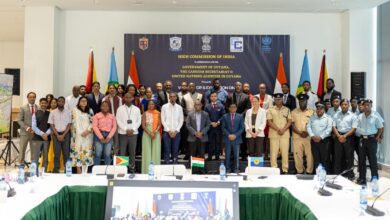The CARICOM-UNSCR 1540 Implementation Programme has undertaken several major initiatives over the past year to prevent proliferation in the CBRN domain and to simultaneously strengthen regional response and interdiction capacity in relation to conventional security challenges, such as illegal weapons and narcotics trafficking. These initiatives are as follows –
Commodity Identification Training (CIT)
The CARICOM-UNSCR 1540 Programme, in collaboration with the National Nuclear Security Administration (NNSA) and the University of the West Indies at St. Augustine initiated the first commodity identification (CIT) training programme ever held in the Caribbean in July 2010. This scalable and sustainable initiative, which will be expanded during 2011, provides both policy and operational personnel with the tools to prevent CBRN-related proliferation and to also enhance activities to stem the illicit trade in guns and drugs.
Customs and Border Controls – Organisation for the Prohibition of Chemical Weapons (OPCW)
The CARICOM-UNSCR 1540 Programme, in collaboration with the Organisation for the Prohibition of Chemical Weapons (OPCW), will in May 2011 conduct awareness-building exercises for CARICOM customs officials, as well as policy personnel, highlighting port and border controls and the role of customs authorities in the implementation of the UNSCR 1540 and the Chemical Weapons Convention.
Customs and Border Controls – World Customs Organisation (WCO)
A joint initiative with the CARICOM 1540 Programme under the World Customs Organisation’s Columbus Programme: Aid for Safe Trade initiative which will offer training in risk analysis and in targeting strategies to prevent the export, re-export, import, transit or trans-shipment of strategic goods. Training will also be focused on the utilisation of trade information and intelligence to detect suspect transfers and to minimise impediments to legitimate trade. The training will also cover implementation of measures to account for, as well as to secure and maintain, the appropriate physical protection of strategic goods.
Natural Disaster Mitigation/Emergency Management
Implementation of joint World Health Organisation (WHO) and CARICOM-UNSCR 1540 Programme initiative to build capacity in natural disaster management and mitigation, and to enhance first-responder capability in public health/mass casualty emergencies. The initiative will focus on existing natural disaster and other security concerns that “dove-tail” with non-proliferation goals and can be addressed through the 1540 implementation process, given the fact that security protocols involved in these processes are also components of standard response systems to events or attacks involving chemical or biological agents.





